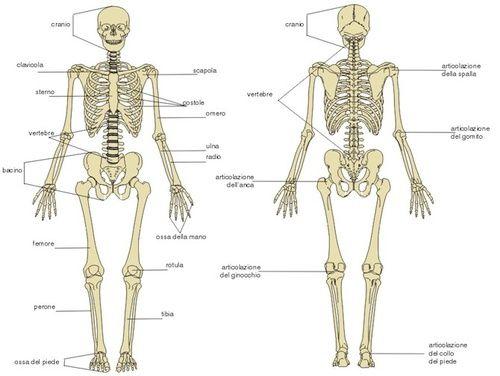, Naturopath
Il football it is the most represented mineral in our organism, in which it is found mainly as fundamental constituent of bones and teeth. The most serious and best known problem brought about by calcium deficiency is osteoporosis, which particularly affects women after menopause and causes a gradual degeneration of the skeletal structure, which is very serious if not adequately counteracted.
> Properties of calcium supplements
> Calcium supplements on the market
> Daily requirement
Milk among calcium food supplements

Properties of calcium supplements
Calcium participates in all vital functions for our body, such as:
- The constitution of the skeletal bone system;
- The regulation of important life processes, including the functionality of the nervous tissue;
- Muscle contraction, and therefore also the regularity of the heartbeat;
- La blood clotting;
- The cohesion of the body's cells;
- La milk digestion, as it allows the clot to form in the stomach. This is the reason why, according to some scholars, it would be better not to abuse milk, but to guarantee the supply of calcium with some of its derivatives.
- calcium-based supplements they are mainly used in the prevention and treatment of osteoporosis. However, among other possible effects that can be useful is weight loss.
In fact, calcium seems to be useful for reducing cholesterol and triglyceride levels in the blood, preventing the formation of clots and maintaining the integrity of the arteries. promoting circulation. This is why calcium seems important in preventing conditions such as hypertension, atherosclerosis and diabetes. It also appears to act as a natural tranquilizer (prevents insomnia and anxiety).
Calcium food supplements
The best food sources of calcium are the XNUMX cups milk, especially the fresh one, and all cheeses, especially the aged ones. Almonds, brewer's yeast, green leafy vegetables, cabbage, dried beans and soy are also rich in calcium.
A good source of calcium are fish, especially those whose bones are also eaten. It also contains a fair amount of calcium the water, especially the mineral one with natural effervescence.
It should be borne in mind, however, that water, during the cooking process, loses most of the calcium it contains, except for the very small part that remains fixed to the food. For the assimilation of calcium it is essential that vitamin D is present in the diet, which has the property of fix this mineral.
Calcium is essential for bones: discover the ailments and natural remedies to keep them healthy

Herbal calcium supplements
Il Litotamnio (Lithothamnium calcareum) is an alga that contains 45% calcium. It is, in fact, an excellent ally against osteoporosis problems, arthritis, osteoarthritis e bone decalcification.
This alga also contains many mineral salts capable of promoting the synthesis of collagen and elastin, thus stimulating the osteopoietic cells that participate in the formation of bones and teeth.
Calcium supplements on the market
Calcium can generally be found in multivitamin and multimineral supplements or as a single substance.
There are mainly calcium food supplements on the market in the form of calcium carbonate and calcium citrate:
- Calcium carbonate it is very cheap, but is better absorbed when taken with meals.
- Calcium citrate, more expensive, it is absorbed well even on an empty stomach.
Taking calcium supplements can bring some mild side effects such as bloating, flatulence and constipation. Should one of these symptoms occur, it is advisable to reduce the calcium dose or divide it into more intake during the day.
Tea, coffee, smoking and alcohol reduce absorption intestinal calcium therefore should be avoided or consumed at least a couple of hours after taking the calcium supplement.
Daily calcium requirement
Il fdaily need, for adults, it is estimated at around 800 mg and increases to 1200 mg in some stages of life (adolescence and, in women, during pregnancy and breastfeeding). We recommend:
- For children from 1 to 6 years 800 mg per day of calcium;
- For children aged 7 to 10 up to 1000 mg per day to allow for healthy development of muscle mass.
- For teenagers up to 17 years the dosage can be increased up to 1200 mg per day.
- Pregnant: since the pregnant woman first transfers to the fetus and then to the breastfeeding infant, about 200-250 mg per day of calcium, it is essential to supplement the transferred calcium to avoid highly debilitating deficiencies.
- Menopause: 1200-1500 mg per day for five years after menopause to prevent loss of skeletal mass.
READ MORE
Calcium deficiency: symptoms, causes and nutrition
Other articles on natural calcium supplements:
> Natural supplements for children: calcium, vitamin D and vitamin K
> Among the supplements for athletes there are also natural calcium supplements
| Susieburrell.com.au


























